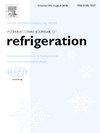Conventional and advanced exergy analysis of a dual-evaporator transcritical CO2 refrigeration system enhanced with ejectors
IF 3.5
2区 工程技术
Q1 ENGINEERING, MECHANICAL
International Journal of Refrigeration-revue Internationale Du Froid
Pub Date : 2025-03-13
DOI:10.1016/j.ijrefrig.2025.03.021
引用次数: 0
Abstract
Based on two conventional dual-evaporator systems, this study introduces ejectors and combines traditional exergy analysis with advanced exergy analysis to conduct an in-depth comparison and optimization of four systems. The main objective of the study is to refine the exergy loss distribution, evaluate the improvement potential of each component, and provide a basis for system optimization. The results show that the introduction of ejectors significantly reduces the system's exergy losses and improves exergy efficiency, with the dual-evaporator transcritical CO2 refrigeration cycle with two compressors (ERCC) system performing the best. Under given conditions, the exergy losses of ejector-enhanced dual-evaporator transcritical CO2 refrigeration cycle with PRV (ERCV) and ERCC systems are reduced to 60 % of those in conventional systems, with exergy efficiencies increased to 53.69 % and 45.28 %, respectively. Additionally, gas cooler pressure has a significant impact on system performance, and the pressure maintaining under 9 MPa can significantly improve exergy efficiency. Advanced exergy analysis reveals that the endogenous exergy destruction is mainly caused by irreversibility, and compressor2 and compressor in ERCC and ERCV should be optimized first, which can improve the system efficiency by 75.36 % and 65.16 %, respectively.
采用喷射器增强的双蒸发器跨临界CO2制冷系统的常规和先进火用分析
本研究以两种传统的双蒸发器系统为基础,引入喷射器,将传统的火用分析与先进的火用分析相结合,对四种系统进行了深入的对比与优化。研究的主要目的是细化系统的火用损失分布,评估各组成部分的改进潜力,为系统优化提供依据。结果表明,喷射器的引入显著降低了系统的火用损失,提高了系统的火用效率,其中双蒸发器双压缩机跨临界CO2制冷循环(ERCC)系统表现最佳。在一定条件下,采用PRV (ERCV)和ERCC系统的喷射器增强双蒸发器跨临界CO2制冷循环的火用损失降低到常规系统的60%,火用效率分别提高到53.69%和45.28%。另外,气体冷却器压力对系统性能影响较大,维持在9 MPa以下的压力可以显著提高火用效率。先进的火用分析表明,内源火用破坏主要由不可逆性引起,应首先对ERCC和ERCV中的compressor2和压缩机进行优化,可使系统效率分别提高75.36%和65.16%。
本文章由计算机程序翻译,如有差异,请以英文原文为准。
求助全文
约1分钟内获得全文
求助全文
来源期刊
CiteScore
7.30
自引率
12.80%
发文量
363
审稿时长
3.7 months
期刊介绍:
The International Journal of Refrigeration is published for the International Institute of Refrigeration (IIR) by Elsevier. It is essential reading for all those wishing to keep abreast of research and industrial news in refrigeration, air conditioning and associated fields. This is particularly important in these times of rapid introduction of alternative refrigerants and the emergence of new technology. The journal has published special issues on alternative refrigerants and novel topics in the field of boiling, condensation, heat pumps, food refrigeration, carbon dioxide, ammonia, hydrocarbons, magnetic refrigeration at room temperature, sorptive cooling, phase change materials and slurries, ejector technology, compressors, and solar cooling.
As well as original research papers the International Journal of Refrigeration also includes review articles, papers presented at IIR conferences, short reports and letters describing preliminary results and experimental details, and letters to the Editor on recent areas of discussion and controversy. Other features include forthcoming events, conference reports and book reviews.
Papers are published in either English or French with the IIR news section in both languages.

 求助内容:
求助内容: 应助结果提醒方式:
应助结果提醒方式:


